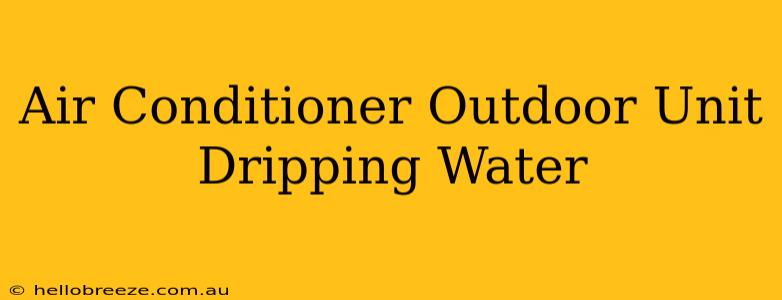Is your air conditioner's outdoor unit dripping water? This is a common problem, but it shouldn't be ignored. Excessive dripping can indicate a serious issue, potentially leading to costly repairs or even damage to your property. This comprehensive guide will explore the common causes of this problem and offer effective solutions. Understanding why your AC unit is dripping is the first step to fixing it and ensuring efficient and safe operation.
Common Causes of Air Conditioner Outdoor Unit Dripping
Several factors contribute to water dripping from your air conditioner's outdoor unit. Let's explore the most prevalent ones:
1. Condensation:
This is the most common and usually harmless reason. Air conditioners work by removing heat and moisture from the air inside your home. This moisture is converted into condensation and expelled outside through the drain line. Slight dripping is perfectly normal. However, excessive dripping suggests a problem with the drainage system.
2. Clogged Drain Line:
A clogged drain line is a frequent culprit behind excessive dripping. Leaves, debris, algae, or even insects can obstruct the line, preventing proper water drainage. The water then backs up and overflows, leading to dripping from the unit. Regular cleaning of the drain line is crucial for preventing this issue.
3. Frozen Evaporator Coil:
In colder climates or when the unit isn't properly maintained, the evaporator coil inside the unit can freeze. When this ice melts, it can cause significant water dripping from the outdoor unit. This often indicates insufficient airflow or a refrigerant problem.
4. Refrigerant Leaks:
Refrigerant leaks can cause ice formation on the evaporator coil, leading to melting and subsequent dripping. Refrigerant leaks also reduce the efficiency of your AC unit, and should be addressed by a qualified HVAC technician. This is a serious issue requiring professional attention.
5. Improper Installation:
Incorrect installation of the air conditioner can lead to various problems, including improper drainage and excessive dripping. If the unit is installed at an angle that hinders proper drainage, water will accumulate and drip.
6. Oversized Unit:
An air conditioner that's too powerful for your space can cool the air too quickly. This can lead to excessive condensation and more dripping than usual.
Troubleshooting and Solutions
Before calling an HVAC technician, try these troubleshooting steps:
- Check the drain line: Locate the drain line and carefully inspect it for clogs. Use a garden hose or compressed air to clear any obstructions.
- Clean the outdoor unit: Remove leaves, debris, and other obstructions around the unit to ensure proper airflow.
- Inspect the evaporator coil (if accessible): Check for ice buildup. If present, it suggests a more serious underlying issue that requires professional attention. Do not attempt to manually defrost the coil.
When to Call a Professional
If the dripping persists after trying these solutions, or if you notice any of the following:
- Significant water pooling around the unit.
- Unusual noises coming from the unit.
- Reduced cooling performance.
- Suspected refrigerant leak.
Contact a qualified HVAC technician immediately. Ignoring these issues can lead to further damage and higher repair costs. A professional can diagnose the problem accurately and provide the necessary repairs or maintenance.
Preventing Future Dripping
Regular maintenance is key to preventing future problems. Consider scheduling annual AC maintenance to identify and address potential issues before they become major problems. This includes checking the refrigerant levels, cleaning the coils, and inspecting the drain line. A well-maintained unit is less likely to experience excessive dripping. By taking proactive steps and understanding the potential causes, you can keep your air conditioner running efficiently and prevent costly repairs.

